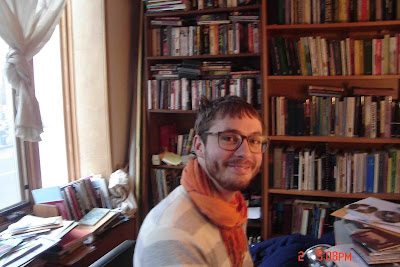15 February 2011
Meta-Discourse and the (Post-) Digital Book
The following is a short excerpt from Thom Donovan's talk "Meta-Discourse and the (Post-) Digital Book (How The Hole Is Still Being Made)" which he delivered this past Friday for Margaret Konkol's Small Press in the Archive lecture series at SUNY Buffalo. I recommend digesting this slowly! Here's Thom:
The book that I have in mind, contra a variety of recent conceptual poetry projects, wishes to destabilize the book not as a commentary on the book’s ontological transformation through digital technologies per se, or the cultural capital of poetry publications per se, or a network of institutions and technologies that undergird poetry as an institution per se. Rather, the cybernetic preoccupations of The Hole wish, like Dana’s work, or say those forthcoming by Suzanne Stein or Brandon Brown (which are being published by Displaced Press in the same series as The Hole), to evidence the book as an unstable object re/distributing affective, intellectual, and social materials (or events?) among an elective affinity of singularities. It also, via a kind of becoming archival, wishes to counter the effects of certain conceptual strategies taken up in writing after the work of 60s and 70s visual art discourse, a discourse often accused by its opponents and detractors of positing a “tomb-like” theatre for art via its archival tendencies.
How to instill the book with living presences that may bear witness to a set of social constellations and coordinates without doing harm to the participants/what has been offered through often unreflective and spontaneous forms of participation? How to resist this move as a gesture invested with cultural capital or as a move in a kind of art game while still being able to reflect critically upon it, or simply acknowledge its tendencies? The prefaces that I intend to include within The Hole, in this regard, reflect both the content of the would-be book, but also how the book is always a kind of performance within a discourse, and specifically as this performance is addressed to one’s peers, friends, and contemporaries (if only after the fact). How not to render lame (or dead) a process that one loves (or has loved) and wishes to further extend? How to circumvent the inevitable tendency for such ‘projects’ to become captured by staid forms of institutionalization, archivalism, or academic research; the negative forms of distribution and critical reception that pervade both commercial and academic culture (however much all of us work in relation to these cultural locations)?
Nor do I think that this kind of book is without precedent. In fact, can’t we read many of Jack Spicer’s books ‘cybernetically,’ as forming a kind of (negative and positive) feedback loop with his community. And can’t we read, as many Spicer scholars have done, Spicer’s reluctance to publish in certain formats and venues as an acknowledgment of the crisis that all authors face when they recognize the fact that their work is largely, if not wholly, socially produced, and that the book-coming-to-be-a-book threatens the very living presence or process of sociality the author would wish to presence through the book? Likewise could we not look to Larry Eigner’s circumstance or Hannah Weiner’s in a similar way, where their severe physical and mental disabilities gave form to writing practices radically reliant and porous to their social milieus, including the technologies that made the production and limited reception/distribution of their works possible (for Eigner, the typewriter and various assistants; for Weiner, a psychotic intermedia in reference to the practices and lifestyles of Downtown contemporaries)?
The book I have in mind raises the specter of coterie, a dynamic that does not cease to replicate itself wherever cultural capital accrues on the outskirts of official communal-institutional formations. With this would-be book, I have asked only certain people to participate, and my procedure has always been (as much as I would like to have included many others) that I should only ask dedicatees and addressees of the poems to offer feedback. So if coterie appears at all, it functions through a constraint—the fact that certain texts were generated in a feedback loop with certain others texts, correspondences, and exchanges. Coterie, I would like to think, is something also potentially destabilized through The Hole.
Something else that this book responds to, which has been a kind of foil for me when I have written about the ‘task of the critic’, or simply about what criticism can do provided with a different function than it currently tends to have with regards to production/reception/distribution, are ways that a book, magazine, critical venue, classroom, poetry reading or other location for poetry’s production/reception/distribution can function through care. What, in other words, is the social-communal value of a book, rather than its value as an object which makes actual and visible unavoidable forms of cultural and real capital? How can the book extend dialogue, conversation, discourse rather than capital (real and imaginary)? How, in an age of Web 3.0, can the physical book engage the cybernetic tendencies of new media, in which participation is largely dependent on certain qualities of attention eroded within our current public sphere? The book I have in mind is a kind of model for forms of attention and exchange (i.e., distribution) that already exist and which can be dramatized and focused through a books’ form (something book artists have been aware of for a long time now, but which has also been a part of our Modernist heritage since the mid 20th century, if not from the very ‘beginning’—think of certain movements of Zukofsky’s “A” for example, or Williams’s Paterson). The book as a site for our sociality, our socialism. The book as a site for the examination of complicity, process, exchange. The book as a place where communal issues become shaped and reshaped. The book as a powerful circuit of mutual regard, conviction, and care. The book as a model of radical and extensive participation.
Subscribe to:
Post Comments (Atom)

No comments:
Post a Comment